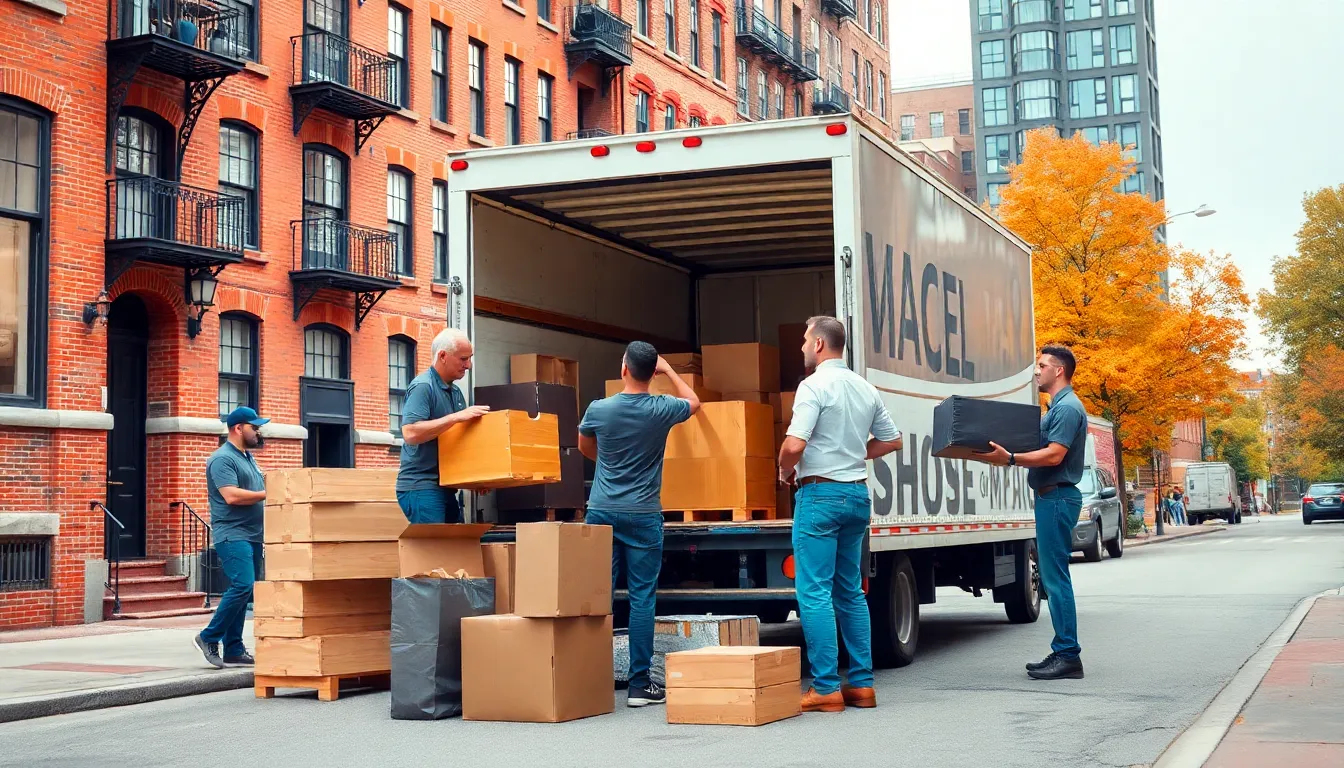Table of Contents
ToggleMoving day in Boston can feel like a scene from a sitcom. Picture this: you’re juggling boxes while dodging a rogue duck in the Public Garden, all while trying to remember where you packed the coffee maker. It’s a whirlwind of excitement, stress, and a touch of chaos. But fear not, because this vibrant city offers plenty of resources to make your move smoother than a bowl of clam chowder.
From navigating narrow streets to finding the best parking spots, Boston’s unique character adds a twist to the moving experience. Whether you’re a first-time mover or a seasoned pro, understanding the ins and outs of moving day in this historic city can turn potential headaches into laughter. Get ready to embrace the adventure, because moving day in Boston is more than just relocating—it’s a rite of passage filled with unforgettable moments.
Preparing for Moving Day in Boston
Preparation makes moving day in Boston smoother. Consider planning ahead to minimize challenges.
Creating a Moving Checklist
Establishing a moving checklist ensures no tasks are overlooked. Start by listing essential items, such as packing supplies, moving vehicles, and necessary utilities. Include tasks like notifying change of address, scheduling movers, and final cleanouts. Organizing daily tasks helps keep the timeline on track. Include deadlines for packing specific rooms and securing parking permits, as they help alleviate last-minute stress.
Budgeting for Your Move
Budgeting is crucial for a successful move. Compile costs associated with hiring movers, renting trucks, and purchasing packing materials. Allocate funds for utility deposits and potential storage fees, as these can add up. Research costs ahead of time to avoid surprises. Create a buffer for unexpected expenses, ensuring financial coverage for the entire process. Prioritizing needs versus wants assists in maintaining a balanced moving budget.
Choosing the Right Moving Company

Selecting a moving company plays a significant role in a successful moving day in Boston. The right choice can ease the transition and minimize stress.
Researching Local Movers
Start by reviewing local movers with a solid reputation. Online reviews, ratings, and testimonials provide valuable insights into service quality. Additionally, checking with the Better Business Bureau can reveal any complaints. Local recommendations from friends and family often guide to trusted companies. Focus on businesses that specialize in urban moves, as they understand Boston’s unique challenges. Gather a list of potential movers for further evaluation.
Comparing Quotes and Services
Collect quotes from at least three different movers to compare prices. Ensure that each quote includes a detailed breakdown of services provided. Some companies may offer packing help, while others focus solely on transportation. Pay attention to extra fees, which can vary significantly among providers. Also, consider the availability of services during peak moving seasons, as this can affect pricing and scheduling. Analyze the overall value of each offer, not just the cost alone. Prioritize based on reliability, insurance options, and customer service.
Packing Tips for a Successful Move
Successful packing ensures a smooth transition on moving day. Efficiency in organization and proper supplies significantly impacts overall stress levels.
Organizing Your Belongings
Start sorting items into categories: keep, donate, and discard. Prioritize essential items, packing non-essentials first. Label boxes clearly to indicate room destination and contents. Designate a specific area for packed items to prevent clutter. Use the opportunity to declutter, discarding anything not needed. By involving family or friends, the process becomes quicker and more enjoyable. Consider adjusting this method for larger rooms by tackling smaller sections at a time.
Essential Packing Supplies
Gather several essential packing supplies before beginning. Use sturdy boxes that suit various item sizes, ensuring adequate strength for heavier items. Acquire packing tape, bubble wrap, and packing paper to protect fragile possessions. Markers enable clear labeling of boxed contents, so keep them handy. Utilize furniture blankets or padding for added protection during transport. Invest in specialized containers for items like clothing or electronics. Don’t forget about zippered bags for smaller miscellaneous items, which help keep everything organized.
Navigating Boston on Moving Day
Navigating Boston on moving day requires strategic planning and awareness of the city’s unique challenges. Key elements include understanding traffic patterns and parking regulations.
Traffic Tips for Boston Roads
Boston’s traffic can be unpredictable, especially during peak hours. Use navigation apps for real-time updates on congestion and alternative routes. Avoid driving during rush hours, typically 7 to 9 AM and 4 to 6 PM. Choosing to schedule moves outside of these times can minimize delays. Consider utilizing public transportation for shorter distances where applicable. Local road construction may also affect travel times, so checking for updates can help in planning. Opting for major thoroughfares like Storrow Drive can expedite your route, while smaller streets may present tighter spaces.
Parking Regulations in the City
Understanding parking regulations is crucial for a smooth move in Boston. Many neighborhoods require permits for street parking, particularly in residential areas. Contact the city’s transportation department to arrange temporary parking permits well in advance. Additionally, look for designated moving zones, which provide safe locations for loading and unloading. Always ensure compliance with street signs to avoid fines. Double-check whether unloading zones have time limits to prevent unexpected tickets. Local enforcement can be strict, so familiarizing yourself with parking restrictions can save both time and money on moving day.
Settling Into Your New Home
Settling into a new home involves several key steps that help create a smooth transition. Completing these tasks ensures a welcoming environment.
Changing Your Address
Notifying important parties about a change of address remains crucial after moving. Update the United States Postal Service to forward mail to the new location. Inform banks and credit card companies to prevent issues with financial transactions. Contact utility companies to transfer services seamlessly, including electricity, water, and internet. Ensuring all necessary documentation is updated helps maintain organization. Updating voter registration and licenses solidifies residency in Boston.
Exploring Your New Neighborhood
Discovering a new neighborhood contributes to feeling at home. Visiting nearby parks, cafes, and grocery stores allows residents to acclimate quickly. Exploring transportation options, such as subway and bus routes, simplifies commutes and errands. Local events often offer opportunities to meet neighbors, fostering community ties. Joining neighborhood social media groups can provide updates on events and activities. Engaging in community activities enhances a sense of belonging. Taking the time to familiarize oneself with the area promotes a smoother transition into home life.
Moving day in Boston is more than just a logistical challenge; it’s an adventure filled with unique experiences. With proper planning and the right resources, anyone can navigate the city’s bustling streets and make the day memorable. By preparing a moving checklist and budgeting effectively, individuals can minimize stress and focus on the excitement of starting fresh.
Choosing the right moving company is essential for a smooth transition, and taking the time to research options pays off. Once settled, exploring the new neighborhood and connecting with the community can enhance the moving experience. Embracing the chaos and joy of moving day ultimately leads to new beginnings in this vibrant city.





